
Press Center
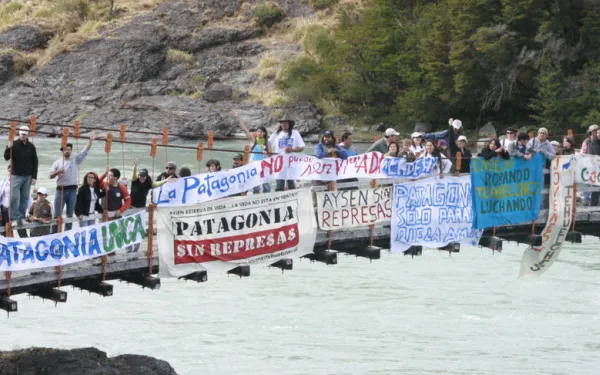
Climate initiatives must not include large hydropower projects – NGOs
In a global manifesto released today, a coalition of more than 300 civil society organizations[i] from 53 countries called on governments and financiers at the Paris climate talks to keep large hydropower projects out of climate initiatives such as the Clean Development Mechanism, the World Bank’s Climate Investment Funds, and green bonds. Large hydropower projects emit massive amounts of methane, make water and energy systems more vulnerable to climate change, and cause severe damage to critical ecosystems and local communities. Including them in climate initiatives crowds out support for true climate solutions such as wind and solar power which have become readily available, can be built more quickly than large dams and have a smaller social and environmental footprint. “Particularly in tropical regions, hydropower reservoirs emit significant amounts of greenhouse gases, comparable to the climate impact of the aviation sector”, said Peter Bosshard, interim Executive Director of International Rivers. “For environmental, social and economic reasons, large hydropower projects are a false solution to climate change.” “Large hydropower projects have serious impacts on local communities and often violate the rights of indigenous peoples to their lands, cultural integrity and free, prior informed consent”, said Joan Carling, Secretary General of the Asia Indigenous Peoples Pact (AIPP). “The resistance of dam-affected communities has often been met with egregious human rights violations.” “Hydropower dams make water and energy systems more vulnerable to climate change,” said Himanshu Thakkar, the founder of the South Asia Network on Dams, Rivers and People (SANDRP). “Dam building has exacerbated flood disasters in fragile mountain areas. At the same time more extreme droughts increase the economic risks of hydropower, and have greatly affected countries that depend on hydropower dams for most of their electricity.” “Wind and solar power have become readily available and financially competitive, and have overtaken large hydropower in the addition of new capacity,” said Astrid Puentes, co-Executive Director of the Interamerican Association for Environmental Defense (AIDA). “The countries of the global South should leapfrog obsolete dam projects and promote energy solutions that are gentle to our climate, our environment and the people that depend on it.” Background Large hydropower projects are often propagated as a “clean and green” source of electricity by international financial institutions, national governments and other actors. They greatly benefit from instruments meant to address climate change, including carbon credits under the Clean Development Mechanism (CDM), credits from the World Bank’s Climate Investment Funds, and special financial terms from export credit agencies and green bonds. The dam industry advocates that large hydropower projects be funded by the Green Climate Fund, and many governments boost them as a response to climate change through national initiatives. For example, at least twelve governments with major hydropower sectors have included an expansion of hydropower generation in their reports on Intended Nationally Determined Contributions (INDCs). Support from climate initiatives is one of the main reasons why more than 3,700 hydropower dams are currently planned and under construction around the world. Further information The civil society manifesto, Ten Reasons Why Climate Initiatives Should Not Include Large Hydropower Projects, is available here. The new video, A Wrong Climate for Damming Rivers, is available at https://youtu.be/UnG_b6egjFk. The following launch events for the manifesto and video will be held in Paris this week: Saturday, December 5th, 12 pm: Press Conference with indigenous leaders and human rights defenders at the International Rights of Nature Tribunal (Maison des Métallos, 94 Rue Jean-Pierre Timbaud, 75011). December 5th, 6 pm - The manifesto and video will be presented at event hosted by the Bianca Jagger Human Rights Foundation (Galerie Thaddaeus Ropac Paris Pantin, Salzburg, 69, Avenue Du Géneral Lecler, 93500, Pantin). Journalists interested in attending should send a request via e-mail by end-of-day December 3rd to: [email protected]. [i] Sponsors: Asia Indigenous Peoples Pact, Asociación Interamericana para la Defensa del Ambiente, Amazon Watch, Bianca Jagger Human Rights Foundation, Carbon Market Watch, France Liberte, International Rivers, Jeunes Volontaires pour l'Environnement International, Oxfam International, REDLAR, Ríos Vivos, Rivers Without Boundaries; South Asia Network on Dams, Rivers and People and Urgewald.
Read moreIf we want to cool the planet, fracking must be banned
Statement from the Latin American Alliance On Fracking at COP21: The goal of the 21st Conference of Parties of the United Nations Framework Convention on Climate Change is to reach an effective agreement that will reduce greenhouse gas emissions to a level consistent with both the rights and opportunities of present and future generations, and the conservation of the environment. This requires national policies and actions consistent with international commitments on climate change and human rights, and which respect the Sustainable Development Goals. Fracking to extract unconventional hydrocarbons is contrary to all of the above commitments, and will actually increase the impacts of climate change – which is why the controversial practice must be banned. During the cycle of extracting, processing, storing, transferring and distributing unconventional hydrocarbons, methane gas – 87 times more powerful than carbon dioxide as an agent of global warming – is released in the atmosphere. The release of methane contributes to global warming at a time when we should be taking any measures necessary to stop it: “within a period of 20 years, the footprint of natural gas released from shale deposits is worse than that of carbon or oil.”[1] If we continue with the concept of development based on the exploitation of fossil fuels, without first taking into account the rights and needs of communities, it will be impossible to conserve a planet that upholds the well being of present and future generations. The unconventional hydrocarbons extracted from the earth by fracking should not be considered transition or clean energies, since both greenhouse gas emissions, and the risks and damages posed to the environment and public health, are very high.[2] Fracking in Latin America We believe that the experience of fracking in Latin America should stimulate global discussion. Despite the particularities with which fracking has advanced on the continent, many similarities have emerged between cases in Mexico, Colombia, Chile, Bolivia and Argentina. Fracking is advancing blindly in Latin America. The basic human rights of affected communities are being ignored, including: the right to consultation and free, prior and informed consent; the right to participation and social control; and the right to information.[3] Governments of the region have failed to apply the precautionary principle, which should be applied considering the serious risks fracking creates for the health of people and the environment, and the uncertainty surrounding the scope and extent of damage it can cause. National laws have been modified based on corporate demands to open the door to the exploitation of unconventional hydrocarbons through fracking. The Mexican energy reform (2013) and the new law on hydrocarbons in Argentina (2014) are clear examples of this. Fracking in the region has developed without any comprehensive, long-term studies on the risks and damages it causes to the health of people and the environment. With the exception of Mexico, the countries of the region lack their own studies of unconventional hydrocarbon reserves that could verify the figures estimated by the U.S. Energy Information Administration. Across the continent, fracking has advanced on indigenous and rural communities, urban neighborhoods and even Natural Protected Areas. It has resulted in the displacement of people and productive activities such a livestock and agriculture, whose coexistence with the technique is impossible.[4] In parallel, complaints and damages have multiplied in response to fires, spills, and explosions; the toxic pollution of water, air and soil; the loss of radioactive substances into wells; and the mismanagement of water.[5] Throughout Latin America, the rejection of fracking has grown. Proof lies in the national and international networks of opposition; the more than 50 communities and municipalities that have banned fracking within their territories in Argentina, Mexico, Brazil and Uruguay;[6] and the suspension of fracking operations through judicial actions in Brazil and Argentina. States should make commitments against fracking In the framework of the Paris Climate Talks, we urge Member States of the Convention to: Sign a binding agreement that efficiently and effectively reduces greenhouse gases to levels compatible with the rights and opportunities of present and future generations, and conservation of the environment. Apply the precautionary principle as a legal and ethical imperative of action to address high-risk situations in a context of scientific uncertainty, in this case banning fracking in countries where it has been initiated or interest in it shown. Conduct objective and independent scientific studies about the risks and impacts of fracking on health, the environment and productive processes, with a long-term goal of ensuring the rights of present and future generations. Where impacts have been confirmed, States should guarantee that companies take responsibility for the damages done and, primarily, for the restoration of the affected environment, even in cases where their contract has ended. Strengthen a policy of energy diversification and the reduced rationalization of energy consumption, which includes the promotion of renewable energies and discourages the extraction of fossil fuels, consistent with principles and rights related to transparency, participation and free, prior and informed consent. On behalf of the Latin American Alliance On Fracking, we warn of the risks and severe damage that the exploration and exploitation of unconventional hydrocarbons can cause to the people and environment of our countries. Fracking is an experimental technique and neither governments nor companies should conduct experiments at such a high risk to the life and health of people and the environment. [1] Food and Water Watch, “The Urgent Case for a Ban on Fracking,” February 2015, http://www.foodandwaterwatch.org/sites/default/files/urgent_case_for_ban_on_fracking.pdf and Robert Howarth and Anthony Ingraffea, “Should fracking stop?” in: Nature, September 15, 2011, vol. 477, p. 272. http://www2.cce.cornell.edu/naturalgasdev/documents/pdfs/howarth%20nature.pdf [2] Robert Howarth “A bridge to nowhere: methane emissions and the greenhouse gas footprint of natural gas,” April 2014, http://onlinelibrary.wiley.com/doi/10.1002/ese3.35/pdf [3]Alianza Latinoamericana frente al Fracking, “Avance ciego del fracking en América Latina” (infographic), September 2015, http://www.opsur.org.ar/blog/2015/09/04/mapa-del-fracking-en-america-latina-2/ [4] OPSur “Alto Valle Perforado” (Ed. Jinete Insomne, 2015) [5] Pablo Bertinat et al; “20 Mitos y Realidades del Fracking,” 2014, http://www.rosalux.org.ec/attachments/article/819/20_Mitos_LIBRO_FRL_PRINT.pdf [6] Alianza Latinoamericana frente al Fracking, “Avance ciego del fracking en América Latina” (infographic), September 2015, http://www.opsur.org.ar/blog/2015/09/04/mapa-del-fracking-en-america-latina-2/
Read more
Brazil authorizes operation of the Belo Monte Dam, disregarding the rights of affected communities
The environmental authority granted the project’s operating license, ignoring evidence of noncompliance with conditions necessary to guarantee the life, health and integrity of indigenous and other affected populations. Altamira, Brazil. The Brazilian Institute of Environment and Renewable Natural Resources (IBAMA) today authorized the Belo Monte Dam’s operating license, which allows the dam’s reservoirs to be filled. The authorization was granted despite clear noncompliance with conditions necessary to guarantee the life, health and integrity of affected communities; the same conditions that IBAMA called essential in its technical report of September 22. IBAMA’s decision makes no reference to conditions needed to protect affected indigenous peoples. “We can’t believe it,” said Antonia Melo, leader of Movimiento Xingú Vivo para Siempre, who was displaced by the dam’s construction. “This is a crime. Granting the license for this monster was an irresponsible decision on the part of the government and IBAMA. The president of IBAMA was in Altamira on November 5 and received a large variety of complaints. Everyone – riverside residents, indigenous representatives, fishermen, and members of the movement – talked about the negative impacts we’re living with. And now they grant the license with more conditions, which will only continue to be violated.” In an official letter to IBAMA on November 12, the president of the National Indian Foundation (FUNAI) concluded that conditions necessary for the protection of affected indigenous communities had clearly not been met. However, he gave free reign for the environmental authority to grant the operating license “if deemed appropriate.” “The authorization clearly violates Brazil’s international human rights commitments, especially with respect to the indigenous communities of the Xingú River basin. Those affected populations are protected by precautionary measures granted in 2011 by the Inter-American Commission on Human Rights, which the Brazilian government continues to ignore,” said María José Veramendi, attorney with the Interamerican Association for Environmental Defense (AIDA). The license allows for the filling of two of the dam’s reservoirs on the Xingú River, an Amazon tributary. It is valid for six years and is subject to compliance with certain conditions; progress will be monitored through semiannual reports. Such conditions should have been met before the dam’s license was even considered, let alone granted. “Environmental licensing is a way to mitigate the effects, control damage and minimize the risks that the dam’s operation entails for the community and the environment. By disrespecting and making flexible the licensing procedures, the government is allowing economic interests to prevail and ignoring its duty to protect the public interest,” said Raphaela Lopes, attorney with Justiça Global. AIDA, Justiça Global, and the Para Society of Defense of Human Rights have argued on both national and international levels that the conditions needed for Belo Monte to obtain permission to operate have not been met. The project must still guarantee affected and displaced populations access to essential services such as clean water, sanitation, health services and other basic human rights. “The authorization of Belo Monte, a project involved in widespread corruption scandals, contradicts President Rousseff’s recent statement before the United Nations, in which she declared that Brazil would not tolerate corruption, and would instead aspire to be a country where leaders behave in strict accordance with their duties. We hope that the Brazilian government comes to its senses, and begins to align its actions with its words,” said Astrid Puentes Riaño, co-director of AIDA. The green light for Belo Monte couldn’t have come at a worse moment. On November 5th, two dams impounding mine waste—owned by Samarco, a company jointly overseen by Vale and BHP Billiton—broke in the city of Mariana, Minas Gerais, causing one of the greatest environmental disasters in the country’s history. A slow-moving flood of mud and toxic chemicals wiped out a village, left 11 dead and 12 missing, and affected the water supply of the entire region, destroying flora and fauna for hundreds of miles around. The toxic flood has since reached the sea. The company’s operating licenses had expired two years ago. Approval of Belo Monte’s operating license comes just six days before the start of the Paris climate talks, the most important meeting of the United Nations Framework Convention on Climate Change in recent history. Once in operation, Belo Monte will emit greenhouse gases including carbon dioxide and methane; as the world’s third-largest dam, it will become a significant contributor to climate change. By authorizing Belo Monte, the government of Brazil is sending a terrible message to the world. Ignoring its international commitments to protect human rights and mitigate the effects of climate change, the government is instead providing an example of how energy should not be produced in the 21st Century.
Read more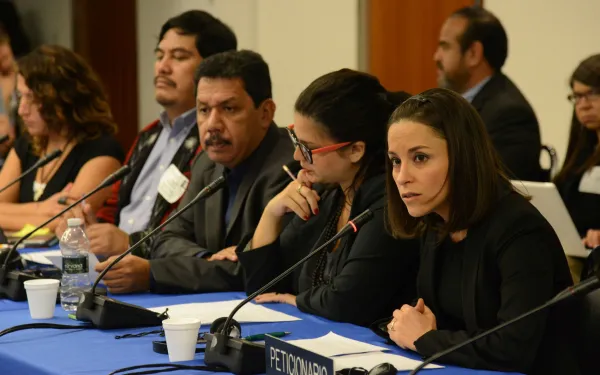
NGOs testify before IACHR regarding violation of the right to water by extractive activities
In a hearing before the Commission, advocates explained how extractive activities, especially mining and energy projects, restrict individual and community water use. They also documented the failure of states to protect the right to water and effectively control companies and projects that affect this right. Washington, DC, United States. Civil society organizations[i] drew the attention of the Inter-American Commission on Human Rights (IACHR) to the growing pressure to use natural resources for the development of extractive activities in the Americas, including the construction of dams and mining projects. They did so at a hearing in which they showed how this situation has resulted in the systematic violation of the right to water in the region. "We have identified four patterns that characterize this problem: the use of judicial frameworks that favor the appropriation of water resources for extractive projects, ownership of the resource that favor its use for mining projects over human use and consumption, pollution and deterioration of water sources, and the lack of consultation and free, prior and informed consent in the implementation of these projects," explained Maria José Veramendi Villa, lawyer from the Interamerican Association for Environmental Defense, at the beginning of the hearing. The organizations presented cases of appropriation, pollution and irreversible damage to water sources due to the implementation of extractive projects. This situation not only affects water rights but also infringes upon other rights such as health, decent life, integrity, healthy environment, food and culture. The participating organizations noted the impacts both on individuals and communities that are in areas directly influenced by projects for which there was no prior consultation, as well as for those who are outside of the immediate project area but depend on affected water sources for their livelihood. Such cases have been documented extensively in a report that was delivered to the IACHR. "In Argentina, the exploitation of the Alumbrera mine has caused the leakage of toxic waste into three rivers and, although a court case on the pollution is open, measures to effectively remediate the damage have yet to be taken. We are concerned that none of our countries are implementing plans to prevent additional damage, nor are they taking measures to remediate the cumulative damage from the pollution," said Johana Rocha, of the Centro de Estudios para la Justicia Social “Tierra Digna” of Colombia. The hearing before the IACHR highlighted the failure of States in the region to implement effective measures to ensure the right to water. The participating organizations reported that existing legal frameworks favor the appropriation of water for mining projects over the use and human consumption. They also explained the failure of national mechanisms to control and monitor the performance of companies that implement extractive projects - a situation which allows them to continue to commit gross violations of human rights. "We have found a contradiction in the States' obligations to protect and guarantee the right to water, which has been incorporated into their Constitutions and legislation. They instead give preference to corporations, thus denying the right to water of the communities," stated Pedro Landa, of the Equipo de Reflexión, Investigación y Comunicación de la Compañía de Jesús (ERIC-SJ) of Honduras. Raphaela Lopes, of Justiça Global, spoke of the easing of legal frameworks, which violates human rights. "With the energy reform recently approved in Mexico, for example, the right to water is undermined in favor of hydrocarbons and electricity." Lastly, the organizations asked the IACHR, among other things, to reaffirm at a national level the recognition of water as a human right; to consider the importance of water as a fundamental element to the right to a healthy environment; to remind States of their obligations to protect the rights to water and environment above any extractive activity or infrastructure; to highlight the obligation of the states to effectively control the activities that could affect the right to water, including the companies that operate within their territory and the national companies that operate externally; and to remind states of the importance of the right to free, and prior, informed consent before the implementation of any project. [i] Acción Solidaria para el Desarrollo (COOPERACCIÓN) – Perú, Asociación Interamericana para la Defensa del Ambiente (AIDA) – Regional, Asociación Pro Derechos Humanos (APRODEH) – Perú, Bienaventurados los Pobres (BePe) - Colectivo SumajKawsay – Argentina, Centro de Acción Legal Ambiental y Social (CALAS) – Guatemala, Centro de Derechos Humanos “Bartolomé Carrasco Briseño A.C.” (BARCA-DH) – México, Centro de Estudios para la Justicia Social ‘Tierra Digna’ – Colombia, Centro de Incidencia Ambiental (CIAM) – Panamá, Centro de Investigación sobre Desarrollo y Comercio (CEICOM) – El Salvador, Comité de Unidad Campesina (CUC) – Guatemala, Comitê Nacional em Defesa dos Territórios frente a Mineração – Brasil, Equipo de Reflexión, Investigación y Comunicación de la Compañía de Jesús (ERIC-SJ) – Honduras, Fundación para el Debido Proceso Legal (DPLF) – Regional, Grupo Internacional de Trabajo sobre Asuntos Indígenas (IWGIA) – Regional, Justiça Global – Brasil, Observatorio Ciudadano – Chile, Pensamiento y Acción Social (PAS) – Colombia, y Pax Christi – Internacional.
Read more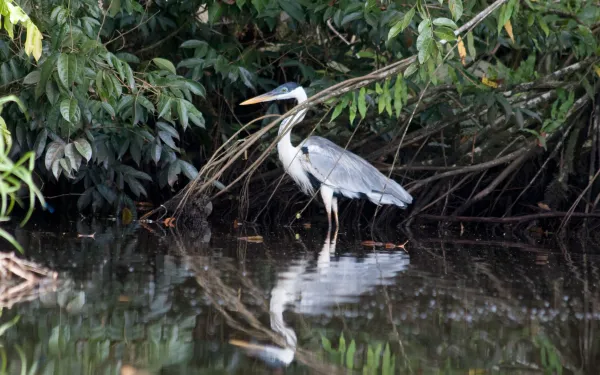
NGOs celebrate suspension of aerial spraying, advance in Colombian environmental law
They highlight the application of the precautionary principle in the resolution to suspend spraying, and pledge to stay alert to the threat posed by the potential manual use of glyphosate or its replacement with another chemical. Bogota, Colombia. Civil society organizations finally celebrate the temporary and preventive suspension of aerial spraying with glyphosate as an advance in the protection of public health and the right to a healthy environment in Colombia. They note that the National Environmental Licensing Agency (ANLA) applied the precautionary principle in the resolution, which ordered the suspension of a technique employed for more than two decades to eradicate coca and poppy crops considered of illicit use. On May 29, Colombia’s National Narcotics Council decided to suspend aerial spraying with glyphosate (Resolution 006). For the measure to be effective, ANLA had to suspend or revoke the Environmental Management Plan of the Program for Illicit Crop Eradication Using Aerial Spraying with Glyphosate (ICEPG). That suspension occurred on September 30 with Resolution 1214. The resolution is founded on the precautionary principle, and follows the recommendations of the Ministry of Health and the National Narcotics Council, both of which were based, in turn, on the opinion of the International Agency for Research on Cancer, which has concluded that glyphosate is a “probable carcinogen" to humans. The Interamerican Association for Environmental Defense (AIDA) considers the application of the precautionary principle an important advance for Colombian environmental law. “Today we can finally celebrate the suspension of the sprayings, after decades of evidence of harm to human health and the environment, and of the program’s inefficiency,” said Astrid Puentes Riaño, co-director of AIDA. For Yamile Salinas Abdala, investigator with the Institute for Studies of Development and Peace (INDEPAZ), “it’s necessary to draw attention to the power the Narcotics Council gave ANLA to resume spraying with glyphosate and employ the use of other herbicides, under certain conditions and through the prior consent of competent authorities, without specifying who those authorities are.” Pedro Arenas, coordinator of the Observatory of Crops and Growers Declared Illicit, said, “In the face of the decision of the President of the Republic and the National Narcotics Council, it was untenable to continue spraying with glyphosate. However, it’s inexplicable that the Director of the Colombian National Police wants to continue using it manually, and that the Ministry of Defense threatened to replace it with another substance to continue aerial spraying. For these reasons, we must remain vigilant.” In May, AIDA and INDEPAZ delivered more than 24,000 signatures to the Colombian Ministry of Justice on a petition launched through the platform Change.org to solicit an end to aerial spraying with glyphosate in Colombia. This month, 10 civil society organizations solicited the National Council for Pesticides and the National Narcotics Council to revoke the eradication program, and advised against the use of other herbicides. The organizations are the Washington Office on Latin America, the Latin America Working Group, AIDA, the Centro de Investigación y Educación Popular, Comisión Colombiana de Juristas, Grupo Semillas, Planeta Paz, Mamacoca, Red de Justicia Ambiental and Proceso de Comunidades Negras (PCN). That request reflected the decisions adopted by the Constitutional Court (Auto 073 of 2014) and the State Council (Rad. 2004-00227-01 of 2013), as well as the recommendations of the Advisory Committee for Drug Policy in the report “Guidelines for a New Approach to Drug Policy in Colombia,” published in May 2015.
Read moreAIDA urges Panamanian Supreme Court to protect water sources
Requested the annulment of a resolution that allows large projects like hydroelectric dams to use up to 90 percent of the water in rivers, lakes and other ecosystems. Panama City, Panama. The Interamerican Association for Environmental Defense (AIDA) has filed a legal brief supporting the lawsuit filed by the Centro de Incidencia Ambiental of Panama (CIAM) seeking annulment of Resolution No. AG-0691-2012, which was enacted by the former National Environmental Authority (ANAM), now the Ministry of Environment. This resolution, which establishes environmental flow, allows up to 90 percent of the water in rivers, lakes, and other natural sources to be used in large projects such as hydroelectric dams. Environmental flow is the minimum amount of water that a river or other channel must contain to maintain its ecological values—refuge for flora and fauna, landscape preservation, and dilution of pollutants, among others—and its social value, or use by communities. The ANAM resolution, annulment of which is sought in the CIAM lawsuit, sets this amount at only 10 percent of an unmodified average for all water bodies and allows the remainder to be used in large infrastructure projects. In its legal brief supporting the lawsuit, AIDA’s primary arguments highlight the Panamanian government’s international legal obligations to protect water resources and guarantee human rights. “We want the judges of the Third Chamber to nullify the resolution, with an understanding of the importance of Panama’s international obligations to maintain an environmental flow that supports the health of aquatic ecosystems and guarantees human rights,” said Haydée Rodríguez, AIDA attorney. AIDA seeks the annulment of the ANAM resolution because it violates the international principles and obligations undertaken by the Panamanian government to protect the biodiversity and rational use of its ecosystems, and to guarantee such human rights as access to water, a healthy environment, and way of life. AIDA also notes that the resolution lacks mechanisms for public participation in the establishment of environmental flow to incorporate the needs of all stakeholders.
Read more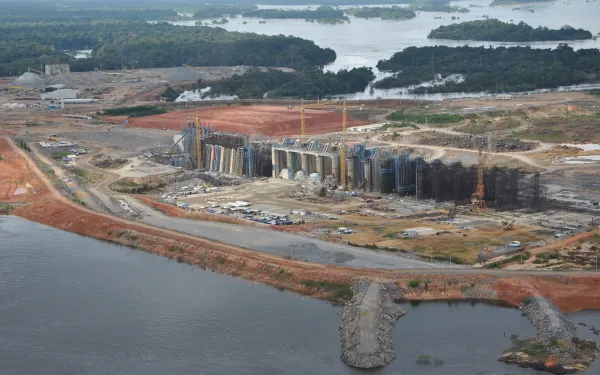
Belo Monte noncompliant with conditions for operation, says environmental authority
Altamira, Brazil. In their technical analysis of the Belo Monte Dam released yesterday, the Brazilian Institute of Environment and Renewable Natural Resources (IBAMA) concluded that the conditions required to approve Belo Monte’s Operating License have not yet been met. Ten of twelve conditions identified by IBAMA as pending compliance are considered essential for granting the license. Until the operating consortium, Norte Energía, addresses these conditions, the project will be delayed and the dam’s reservoir will not be flooded. “We welcome IBAMA’s thorough evaluation of Belo Monte, a project that has already had severe impacts on the environment and human rights,” said Astrid Puentes Riaño, co-director of AIDA. “Moving forward, it is crucial that all conditions are met, and measures to protect the people and environment of the Xingú River basin are fully implemented before the license may be granted.” The Interamerican Association for Environmental Defense (AIDA) has for more than 5 years supported indigenous and local communities and organizations in their fight to denounce the irregularities of the Belo Monte project. The conclusions outlined by IBAMA reinforce the arguments of those who have long opposed the dam for its negative socio-environmental impacts. “If the Brazilian government approves Belo Monte’s operating license without first guaranteeing the protection of the environment and human rights, they would be violating their international commitments,” said María José Veramendi Villa, AIDA attorney. AIDA and partner organizations have long argued that conditions do not exist for the approval of licenses for Belo Monte. Essential services that would guarantee minimum rights to the displaced population remain outstanding, including potable water and health and sanitation services. In 2011, the Inter-American Commission for Human Rights granted precautionary measures in favor of affected indigenous communities. The severity of the project’s human rights violations have been reinforced in a report by the Socio-Environmental Institute (ISA) of Brazil, to which AIDA contributed, as well as in information gathered by the health and indigenous protection authorities and the Brazilian Public Ministry. AIDA expects that IBAMA’s technical report will be taken into consideration when making the final decision on the dam’s operating license. The outright denial of the license would serve as a paradigm for future mega-projects planned in the Brazilian Amazon, as well as other parts of the region, sending a clear message that economic development projects must not engage in human rights violations.
Read more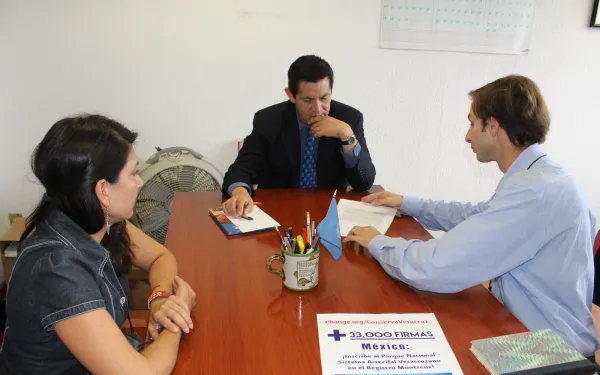
Nearly 37,000 people urge SEMARNAT to protect Mexico’s natural treasures
The Los Tuxtlas Biosphere Reserve and the Veracruz Reef System are at risk from the expansion of the Port of Veracruz, authorized by SEMARNAT. Signatures to protect the important natural sites were collected on a citizens’ petition at change.org/saveveracruz A coalition of organizations has alerted the Scientific Committee of the Inter-American Commission for the Protection of Sea Turtles of the threat the project poses to sea turtles. Yesterday civil society organizations delivered more than 36,000 signatures urging Mexico’s Secretary of Environment and Natural Resources (SEMARNAT) to revoke an environmental permit granted for the extraction of basaltic rock from Los Tuxtlas Biosphere Reserve for the expansion of the Port of Veracruz. The highly successful citizens’ petition was delivered to José Luis Juan Bravo Soto, the Director of Citizen Services at SEMARNAT, and David Gutiérrez Carbonell, the Director General of Conservation Development at CONANP. The authorization granted to the Port Authority of Veracruz by the government in June 2014 would increase the damage the port has historically cause to the surrounding coral reef ecosystem, and put in danger two of the most important natural treasures in Mexico: the Los Tuxtlas Biosphere Reserve and the Veracruz Reef System. The Interamerican Association for Environmental Defense (AIDA), the Centro Mexicano de Derecho Ambiental, A.C. (CEMDA) and the organizations Resistencia Organizada por la Conservación Ambiental (La Roca) and the Asamblea Veracruzana de Iniciativas y Defensa Ambiental (LAVIDA) stated in a press conference that the Veracruz Reef System is already in grave danger due to SEMARNAT’s approval, without sufficient technical and scientific information, of a plan to modify the borders of the Veracruz Reef System National Park in order to expand the Port of Veracruz. Permission granted for the extraction of basaltic rock from Los Tuxtlas Biosphere Reserve for construction of the port’s new jetties conflicts with the Reserve’s management program, which expressly prohibits the use of explosives in the area. This region contains one of the last rainforests in Mexico, serves as a natural barrier against hurricanes and tropical storms, provides a refuge to millions of plant and animal species, and is home to many communities. In addition to actions taken so far, on September 22 AIDA and CEMDA presented a report before the Scientific Committee of the Inter-American Convention for the Protection and Conservation of Sea Turtles (IAC), detailing the direct and indirect impacts that the expansion of the Port of Veracruz would have on sea turtles and their habitat. The Veracruz Reef System is the largest coral ecosystem in the Gulf of Mexico. It works as a natural barrier against waves and storms; in 2010 it protected the city of Veracruz from Hurricane Karl. It is also home to a large variety of flora and fauna. The coasts of Veracruz, including the reef system, receive at different times of year five species of neotropical sea turtles. The Port Authority said in its environmental impact statement that the project “will never have a direct effect on protected species.” The statement, however, failed to provide protection measures for sea turtles, particularly for the hawksbill turtle, listed as a threatened species under both the Sea Turtle Convention and Mexican law. This species is found in the Veracruz Reef System National Park and has migration routes throughout the Gulf of Mexico. SEMARNAT authorized the expansion project in December 2013, without requiring a special management plan for the conservation of the hawksbill sea turtle. The authorization, therefore, runs contrary to the obligation of the Mexican government to promote the protection, conservation and recovery of sea turtle populations and the habitat on which they depend, particularly spawning and feeding grounds. It does nothing to restrict human activities that could affect the turtles, particularly during periods of breeding and incubation. The Veracruz Reef System was declared a Natural Protected Area in 1992 and was registered, in 2004, as a Wetland of International Importance in accordance with the characteristics established by the Ramsar Convention. The authorization granted by the environmental authority therefore contravenes national and international standards and does not properly consider the cumulative impacts that the project would have on the ecosystem. It also ignores the Mexican government’s responsibility to protect the biodiversity found within its territory, and disregards the National Biodiversity Strategy and provisions of the Convention on Biological Diversity. Sign the petition at: change.org/saveveracruz Photos of the delivery of signatures: http://www.cemda.org.mx/?p=4555
Read more
Belo Monte Dam may begin operations despite noncompliance
The dam has failed to comply with conditions for the protection of the health, integrity and way of life of affected communities. Organizations reiterate the validity of the precautionary measures granted by the Inter-American Commission on Human Rights in favor of the indigenous communities of the Xingú River basin, whose situation of risk has worsened. Altamira, Brazil & Washington, DC – The Belo Monte dam is applying for authorization to begin operations, with construction reported at 70 percent complete. This authorization may happen despite the fact that the project has failed to comply with conditions necessary to protect the health, integrity and way of life of affected communities, including the indigenous peoples of the Xingú river basin. Civil society organizations solicited the Inter-American Commission for Human Rights to maintain the precautionary measures granted in 2011 in favor of the indigenous peoples of the Xingú river basin. They did so as a response to the Brazilian government’s request that the Commission lift the measures, which were authorized to avoid irreparable damage to the rights of the communities. The Interamerican Association for Environmental Defense (AIDA), Justiça Global, the Sociedad Paraense de Defensa de los Derechos Humanos (SDDH) and the Movimiento Xingú Vivo para Siempre (MXPVS) filed the brief on behalf of indigenous and river communities affected by Belo Monte. The organizations argued before the Commission that the social and environmental situation surrounding Belo Monte continues to be serious and urgent, and could cause irreparable damages. Their arguments are based on a recent report by the Socio-Environmental Institute of Brazil (ISA), as well as on official government data that include information from health and indigenous protection authorities and the Public Ministry. The ISA report analyzes in detail the situation of Altamira, Pará—the region where Belo Monte is being constructed—and emphasizes the human rights violations and irregularities of the project. The report warns that necessary conditions do not exist for the Brazilian Institute of Environment and Renewable Natural Resources (IBAMA) to grant the project’s operating license. If granted, the license would authorize the filling of the dam, and, thus, the final diversion of the Xingú River. One part of the dam would then begin operation. According to the ISA report, measures to avoid the project’s impacts on health, education and basic sanitation have not been met. This neglect will lead to further damage, such as the fracturing of indigenous communities, saturation of public health services, lower quality education, and greater forest degradation. “The consequences we announced years ago are now a reality,” said Astrid Puentes Riaño, co-director of AIDA. “The filling of the dam, scheduled for the year’s end, will cause the loss of homes and land, and the modification of the traditional lifestyles and livelihoods of Xingú communities. Brazilian authorities and the Commission must act effectively to prevent this disaster.” It is clear that the conditions necessary for Norte Energía, the consortium in charge of the project, to receive the license are not in place. The vice-governor of Pará explained that although the construction is 70 percent complete, only 30 percent of the social and environmental conditions have been met. Similarly, the Attorney of the Republic of Altamira, Thais Santi, said that the consortium is not respecting the protection plan for indigenous lands, the principal condition for the protection of the peoples of the Xingú. The decision on the authorization of Belo Monte must also take into account the recent corruption scandal that has engulfed the project. The investigation Lava Jato, which began a year ago, exposed a massive network of corruption involving the government and Brazil’s largest construction companies. A senior executive, currently in prison on corruption charges, mentioned in his declaration how they had set up and executed bribes for the construction of Belo Monte. The Comptroller General (CGU) thereafter decided to investigate the use of public funds in the project. “The lack of effective control in the execution of the project has made the consequences much worse than anticipated. Giving free reign of operation to the dam at this time would mean completely shutting down the options available to avoid major social and humanitarian disasters in the region,” said Sandy Faidherb of SDDH.
Read moreGreen Climate Fund disappoints by accrediting unfit entities
During its 10th session, in a process characterized by little transparency, the Board of the Green Climate Fund accredited 13 entities to manage financing that the Fund authorizes for climate change adaptation and mitigation projects. The Board accredited the entities as a group, without carefully analyzing them one by one. They did not consider that some have been penalized for financing terrorism and laundering money, or that their primary lending portfolios support fossil fuels. Nor did they consider that some haven’t shown sufficient capacity to manage high-risk climate change projects that could cause irreparable environmental and social impacts. Some do not comply with international fiduciary standards to handle such activities. “We’re disappointed to see that the Green Climate Fund has demonstrated business-orientated behavior, no different from other financial institutions. This doesn’t help the Fund contribute to a paradigm shift and offer better access to resources for local actors,” said Andrea Rodríguez, a senior AIDA lawyer and civil society observer at the Board meetings. The decision-making process for the accreditation of the 13 entities lacked transparency, as no names of the candidates were known until the decision was made. Nevertheless, civil society organizations were able to obtain information to identify inappropriate backgrounds of some of the entities seeking accreditation, and asked the Board to decide on a case-by-case basis. They also requested that the Board assess evidence questioning the ability of these institutions to manage high-risk projects, and to ensure that only the best entities are accredited. The Board, however, opted to make a hasty decision. It reviewed the proposals in a closed Executive Session, and accredited all 13 entities together without considering their problematic histories. “By acting this way, the Board risks the reputation, credibility and legitimacy of the Green Climate Fund,” Rodríguez added. The Board should ensure that all entities seeking accreditation meet the same standards required for access to Fund resources. Developing countries depend on the integrity of accredited entities to ensure access to the financing they need to confront the increasingly severe effects of climate change. It remains vital that the Board guarantees transparency in its decision-making processes.
Read more